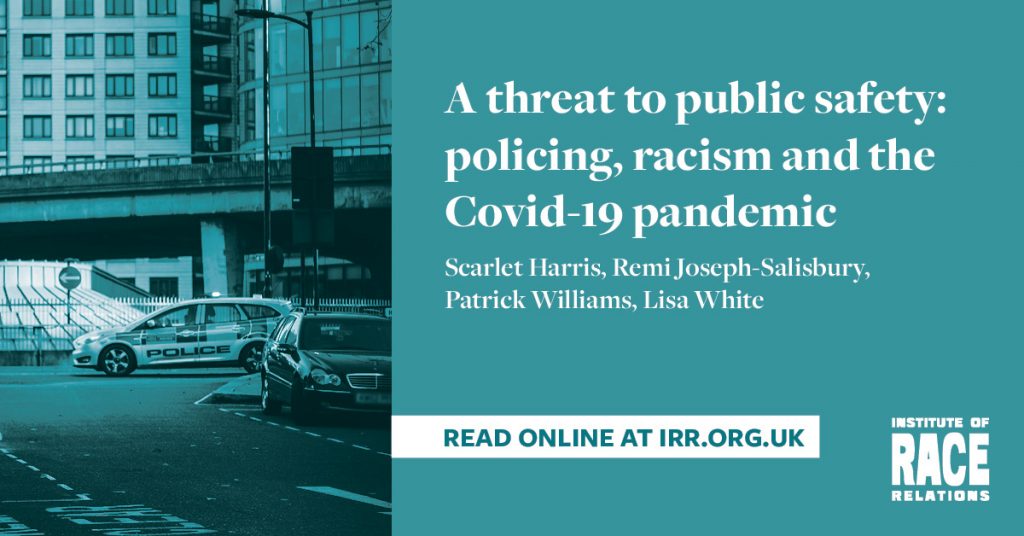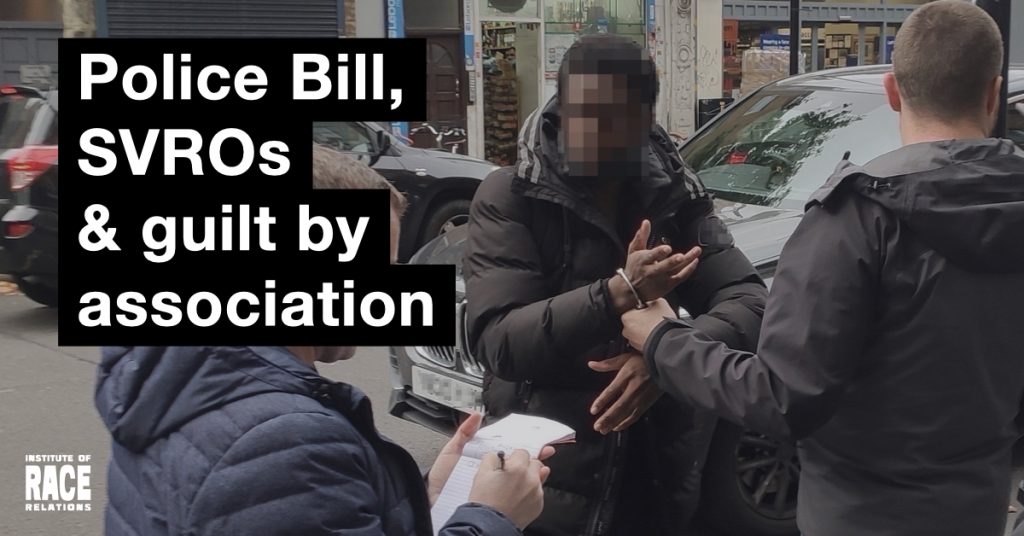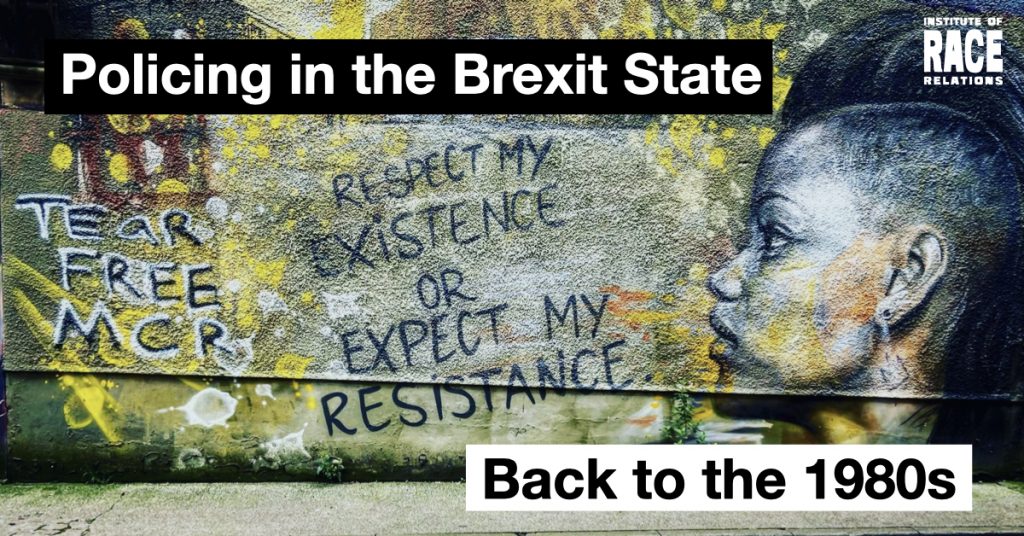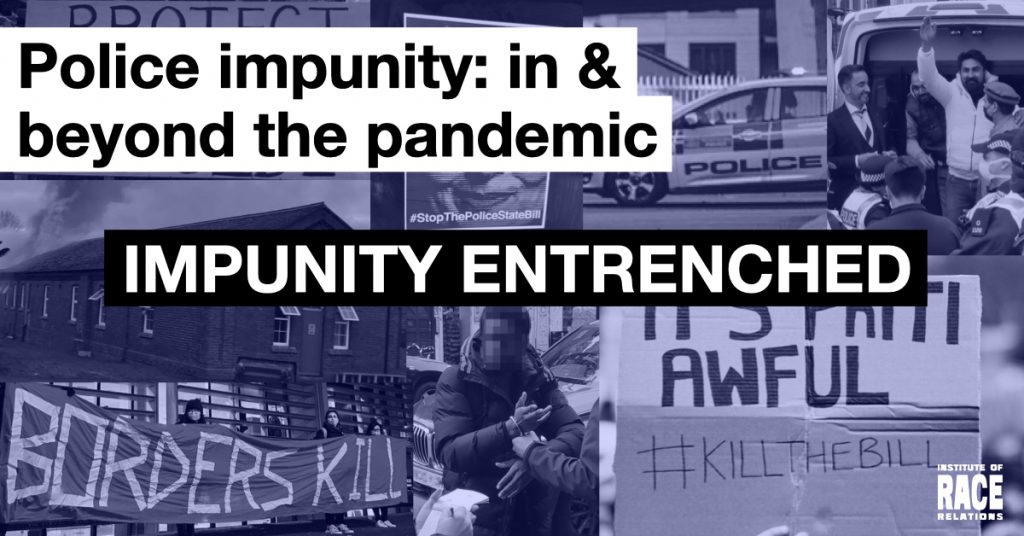As revelations of police racism, misogyny and brutality mounted in 2021 – in policing public protests, in encounters with black people, in statistics on stop and search and the use of force – the government responded to calls for change by granting police more powers and protections, and rather than making them more accountable, making other public bodies accountable to them.
Police violence, racism and misogyny were frequently in the news in 2021. Violence at the Sarah Everard vigil in March led to calls for Met Police commissioner Cressida Dick to resign (although a hurriedly-commissioned HM Inspectorate of Constabulary report exonerated the Met of excessive force), and the policing of the vigil and of the Kill the Bill demonstrations was condemned by the All-Party Parliamentary Group on Democracy and the Constitution, whose chairman warned that ‘The police must not become the enforcement agency of the state against those who … call for change’. In November, over 100 incidents of police intimidation and harassment against climate activists protesting at the COP 26 summit in Glasgow were alleged in a Netpol and Article 11 report.
In June, a serving officer was convicted of manslaughter for the killing of black former footballer Dalian Atkinson in 2016, by firing a stun gun into him for 33 seconds – six times longer than the norm – and then kicking him twice in the head, so hard that he left an imprint of his boot. And in December, two Met officers were jailed for misconduct in office for taking and sharing photos of murder victims along with racist and misogynist comments. Following their conviction, it emerged that a Merseyside officer had been dismissed in November for similar activities, carried out over years on an ‘almost industrial scale’.
It may seem odd to talk about the entrenchment of impunity in the light of the disciplinary and in some cases criminal cases brought against these offending officers. But as the IRR’s Liz Fekete commented, ‘Cases such as these … are proliferating because these officers believe they are above scrutiny due to a culture of denying racism and silencing whistle-blowers within the force.’
Where denial of racism leads
We can also see this culture of impunity and denial in operation in the wildly disproportionate stop and searches performed on black people, who in 2019-20 were stopped nine times more frequently than whites. The Met commissioner, who is strongly supported by home secretary Patel and prime minister Johnson, claims that black people commit more crimes, denying that structural racism informs the gross disparities in policing white and black crime. A 14-year-old boy complained in November of being stopped and searched 30 times in the past two years despite never having been charged or convicted of an offence, but the Met’s response revealed only bureaucratic defensiveness, no regret. The Home Office delayed the release of the annual stop and search figures for 2020-21, citing data quality issues. Campaigners believed the real reason was to avoid scrutiny of the use of the tactic on black youth while measures to increase its use were going through Parliament in the Police, Crime, Sentencing and Courts (PCSC) Bill. When finally published, the figures revealed that stops and searches rose by a quarter to nearly 700,000 in the year to March 2021, with the equivalent of one in five BME 15-19-year-olds searched. Boris Johnson said in July, unveiling plans to allow more suspicionless stops and searches, that the powers were a ‘kind and loving’ act. The most recent version of this appears to be the Met’s use of ‘stop and swab’ instant drug tests, for which the legal basis is unknown. This disproportion is also seen in the prolonged use of tasers; according to an analysis of 101 cases over five years by the Independent Office for Police Conduct, while black people were no more likely to be tasered than white, those tasered were far more likely to be subjected to a prolonged discharge.
The over-policing of racialised minorities, driven by ‘unreasonable suspicion’ or a ‘presumption of criminality’, has also been seen in the police’s use of emergency powers during the pandemic, creating a threat to public safety with tactics such as kettling and police refusal to wear masks, which endangered the safety of the policed.

The PCSC Bill: ideological policing
All this is about to get worse. The police are set to be granted yet more powers, and those they police subjected to more restrictions, prohibitions and intrusions, under crime reduction proposals and legislation going through Parliament. A decisive move away from an ethos of policing by consent (however honoured in the breach) to a more colonial-style force, designed to protect the powerful against the powerless, is marked by the Police, Crime, Sentencing and Courts Bill, introduced in March 2021, an enormous and wide-ranging piece of legislation with 177 clauses – grown to 179 by the end of the year – and 20 schedules. Its sheer size and range impede proper scrutiny, as the House of Lords Constitution Committee pointed out. As Liz Fekete argues, the Bill not only privileges the police’s wellbeing and protection through the Police Covenant, but also establishes them as a commanding authority to which other public bodies are accountable in a multi-agency partnership to tackle serious violence which, like the Prevent duty, blurs the boundaries of policing, obliging local authorities, health, youth and education sector workers and other public agencies to disclose information on service users to police (a late amendment removed health service patients from the scope of the disclosure provisions). Frontline professionals fear they will be caught in a vice of mistrust, their pastoral role subverted.
The Bill’s provisions on Serious Violence Reduction Orders target anyone with a weapon-related conviction, including those convicted under joint enterprise laws without ever carrying a weapon – once again, the target is poor and racialised communities. The measures allow courts to impose conditions of registering with police, and any other conditions or prohibitions which a minister may impose by regulations. The order, which can last for up to two years and is renewable, allows police to conduct suspicionless stop and search on the person concerned, at any time, in any public place. This gives police the power of unlimited harassment of anyone subject to such an order, who can be sentenced to up to two years for breach of conditions.
The extension of stop and search powers, along with other proposals for crime reduction announced in July, which included more electronic tagging on release for thieves, ‘alcohol tags’ for drink-fuelled offenders in Wales, and hi-vis jackets to shame offenders on community service, were condemned as ‘weird and gimmicky’ and ‘an explosion in a strategy factory’ by senior police chiefs, who said they were time-wasting, would not cut crime and did not address the big issues such as poverty and widening inequality. And as Justice noted in its submission on the Bill, and as the government’s own equality impact statement acknowledged, the Bill’s sentencing measures, which include statutory minimum prison sentences for specified offences, increased tariffs and blanket changes to early release rules, also discriminate against BME and particularly black people – discrimination justified by an unapologetic and confrontational government as ‘protecting the public’.

Part 4 of the PCSC Bill targets another racialised and marginalised minority. Its criminalisation of unauthorised encampments, in the context of a lack of authorised sites, and the power to seize homes – powers that the police did not ask for or want, makes of Gypsies, Roma and Travellers an abandoned and criminal class denied the right to a home. As the Joint Committee on Human Rights observed,[1] given the chronic lack of authorised sites and the absence of a statutory duty on local authorities to provide them, the provisions violate the rights to respect for family and private life and the right to a home, protected by Article 8 of the ECHR, and self-evidently discriminates against GRT communities instead of facilitating their way of life. The committee pointed out that the criminal law should not be used to address a planning issue. The provisions would also, as several homelessness charities pointed out, criminalise homeless people – those forced to sleep in a van or car on a road, a car park or a private drive.
The provision which makes damage to memorials indictable-only and thus punishable by up to ten years’ imprisonment is a nakedly political use of criminal justice in the culture wars against those demanding a reckoning with slavery and colonialism. But this provision might well come back to haunt the government, as jury trials provide an opportunity for defendants to educate their fellow citizens – jurors and the wider public – on the issues, as the trial of the Colston 4 has demonstrated. The culture wars also form the background to the most widely publicised and criticised part of the Bill, Part 3, imposing more controls on public protests – apparently designed to deal with BLM and climate activism.[2]
In September, 665 health, social and youth workers and teachers sent an open letter to the home secretary warning that the PCSC Bill was oppressive; a petition opposing the Bill’s proposals has been signed by 600,000 people, and more than 30,000 people have written directly to the prime minister to object to it. Quite apart from the sheer nastiness of the plans, it is pure folly to create more statutory duties for desperately overstretched health, education and youth workers, and more criminal offences, more imprisonment and lengthier sentences when the criminal justice system is in a state of virtual collapse. With 295 courts having closed in England and Wales, the backlog of cases awaiting trial in the crown courts stands at about 60,000.
Total surveillance?
Chapter 3 of Part 2 of the Bill, on the prevention, investigation and prosecution of crime, puts on a statutory basis the extraction of information from electronic devices by police, following criticism by the Court of Appeal and the Information Commissioner of the wildly excessive amount of information extracted from the phones of victims of crime, some very personal and most irrelevant to the investigation.[3] The Home Office promised safeguards to avoid such massive invasions of privacy, but the consent of the user or, in the case of a child, a responsible adult, and the requirements for proportionality set out in the Bill provide wholly inadequate protection, according to groups including Privacy International, Big Brother Watch and Liberty.
This part of the PCSC Bill also applies to immigration officials, who appear to have been acting illegally in seizing phones and extracting data for some time. Immigration minister Chris Philp said in November 2020, answering a parliamentary question, that the mobile phones of all migrants arriving at Tug Haven, Dover were seized ‘as part of an investigation into the organisation involved in the facilitation’. The minister appears not to have considered whether such seizures and digital extractions had any legal basis. An FOI request by Byline Times revealed that over 7,000 phones were seized between July 2019 and May 2021, and its investigation found evidence of officials threatening migrants with immediate court action if they did not comply, with phone seizure receipts stating, ‘You are lawfully required now to provide the officer seizing the phone the PIN/security code which unlocks it. It is an offence to fail to provide these details.’ Three weeks after the FOI request, the Home Office issued a policy on seizure and digital extraction, clarifying that if the person concerned was not a suspect consent had to be obtained. While the new policy, issued in May 2021, tells officials to keep phones for the minimum time possible, some migrants have been waiting a year for the return of their phone.
Digital extraction is one of many areas where concerns are raised by the extension of digital forensics and data analytics. According to Privacy International, the Data Services and Analytic Unit, a secretive Home Office unit, has data on 650 million people, including ethnicity, nationality, immigration status, criminal record and biometrics, obtained from over 30 mostly secret data providers. The Home Office digital enforcement plans involve sharing data in real time with employers, the NHS and other public services. Post-Windrush, it takes little imagination to fear the consequences, particularly as data protection standards appear so lax. The Digital Forensic Specialist Group of the Forensic Science Regulator also cites inaccuracies, misinterpretation, loss and overwriting of data, sending data to the wrong individuals or organisations and a software tool that produced incorrect results.[4]
The use of facial recognition technology in policing has been controversial for years, for a number of reasons including racial bias and false alerts, privacy issues, and concerns about the uses of the images collected by an increasingly powerful and politicised police. In November, the Information Commissioner told Clearview AI, whose facial recognition software is used by police forces, to stop processing UK personal data and delete any it has. Clearview AI is closely associated with the US far Right, and is notorious for scraping social media sites to harvest users’ facial data to amass probably the largest facial database in the world, with over 10bn images. Another facial recognition company, Facewatch, sells security systems that alert staff to the presence of a ‘person of interest’. Facial recognition software provided by iProov is also used to perform automated ID checks on people signing up for the NHS app. Concerns about police use of facial recognition technology were heightened by the report in October that the National Police Air Service (NPAS), which provides air support to police in England and Wales, issued a callout for drone-mounted cameras which can transmit high-quality live footage from 1500 feet even in low light, picking out facial features as well as clothing and car number-plates.
The government seems determined to erode protections against reckless and damaging use and sharing of data. In September, it launched a consultation on personal data, one of whose proposals is to loosen data protection regulations, enabling the use of already collected data for a different purpose, the joint processing of data by police, intelligence and security services and private-sector ‘national security partners’. We know who some of these partners are: companies like Palantir, founded by right-wing billionaire and avid Trump supporter Peter Thiel and notorious for its role in immigration raids and deportations. Palantir has already been given NHS and ‘border flow’ contracts. Other ‘partners’ could include facial recognition companies, even perhaps Clearview AI. According to Open Rights, the proposals, originating with the government-appointed Taskforce on Innovation, Growth and Regulatory Reform (TIGRR), would ‘gut the GDPR and your privacy rights’. With such total surveillance, we are well on the way to a fully-fledged police state. One in which many functions are carried out by algorithm: another of the data consultation proposals, IT industry bodies warn, is the removal of all human review from automated decision-making which has legal effects. This despite the fiasco of algorithm-produced A-level results in 2020 and the knowledge that algorithms amplify racial bias in visa decisions.

Resistance
There is huge anger at the PCSC Bill; in addition to the vast numbers of people who have petitioned and written letters, there have been a large number of public protests and demonstrations. Most of the anger is directed at the right to protest: the hypocrisy of such stringent restrictions being brought in by a government which wages war on ‘cancel culture’ is not lost on the protesters. There is also anger at the well-publicised provisions criminalising unauthorised encampments. But it will take some time, and the experience of policing once the Bill is enacted, for widespread resistance to build to other parts of the PCSC Bill, such as the Serious Violence Prevention Duty – and the other policing measures going through or being implemented, particularly those enabling total surveillance, which are likely to have profound effects on civil society. There are signs that the abolitionist movement is gaining greater traction, with its slogan ‘Defund the police’, which demands the withdrawal of lethal weapons, strategies targeting racialised communities, the use of ‘pre-crime’ orders and laws criminalising survival, in favour of investment in public safety through increased spending on health, education and housing.
This is the second in a 5-part series, Impunity Entrenched, examining the sheer proliferation of government measures and proposals put forward during 2021. IRR Vice-Chair Frances Webber reviews Borders and Immigration, Policing, Ministerial impunity and the rule of law, Free expression and equalities, and Human Rights. Read the whole series>

